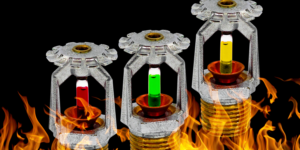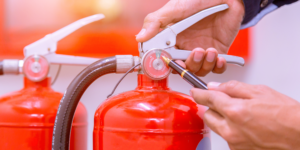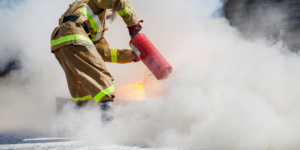Having the right fire safety measures in place can make the difference between minimal damage and terrible loss. Fire sprinklers and extinguishers are typical fire defense measures. Which is better? We will compare the pros and cons of fire sprinklers and fire extinguishers to help you choose one.
Brief overview of fire sprinklers and fire extinguishers
Fire sprinklers and extinguishers are crucial fire protection components that protect lives and property. Fire sprinklers are water-connected pipes mounted on building ceilings or walls. They trigger the nearest sprinkler heads when they sense fire heat. These sprinkler heads extinguish flames by spraying water.
However, fire extinguishers can be transported and used to put out tiny flames. They contain foam, dry powder, or carbon dioxide to extinguish fires by eliminating oxygen or preventing chemical processes.
Both fire sprinklers and extinguishers fight flames, however, their coverage areas and ease of use differ. Heat triggers fire sprinklers to protect larger places without human involvement. Manual extinguishers are more flexible for quickly extinguishing tiny fires.
Although neither approach is always better, their effectiveness relies on building size, occupancy type, budget, and local rules. Businesses and homeowners must examine their demands before choosing a system.
How do fire sprinklers work?
Building fire safety systems require sprinklers. Heat triggers these devices to release water on the fire, dampening it and preventing its spread.
A fire heats a sprinkler head, starting the process. Each sprinkler head has a heat-sensitive element that expands or melts at certain temperatures to release water. Contrary to popular assumption, only the sprinkler heads closest to the heat source operate.
Water flows through pipes connected to a reliable water supply system when activated. The pressurized system forces water from each open sprinkler head into the impacted region. This rapid action puts out fires before they grow.

Fire sprinklers respond immediately without smoke detectors or manual activation. They effectively protect homes, businesses, and industries against fires 24/7. Fire sprinklers maximize efficiency with customized settings and fast response times. They reduce structure damage from excessive water use by operating only over flames.
Numerous studies have demonstrated that properly placed and maintained fire sprinklers can dramatically reduce property damage compared to no automatic suppression systems. Fire sprinklers fight flames quickly and efficiently, minimizing losses. These life-saving technologies can safeguard your loved ones and coworkers in the event of a fire.
How do fire extinguishers work?
Fire safety requires fire extinguishers to swiftly and effectively put out small fires. But how do these reliable devices work? The extinguishing agent in a fire extinguisher depends on the fire it fights. Water, froth, dry chemical powder, CO2, and halon are common.
After a fire starts, the user points the nozzle at the flames and squeezes the handle or trigger. Pressurized gas propels the extinguisher toward the fire. Flames are smothered or cooled by the agent.
Fine particles in dry chemical powder extinguishers separate fuel from oxygen to stop combustion. Water-based extinguishers cool heated surfaces by absorbing heat quicker than it can be created.
CO2 extinguishers choke fires by displacing oxygen and reducing heat due to their low temperature. Halon was widely used but is now banned due to environmental concerns. Chemically inhibiting flame propagation worked.
All fire extinguishers aim to put out fires before they spread. With this information, people can act quickly in emergencies and prevent significant harm or injury.
While having a functioning fire extinguisher is important, so is good instruction on how to use it safely!
Comparison of effectiveness in controlling fires
The effectiveness of a fire control and extinguishing system is crucial to fire safety. Fire sprinklers and fire extinguishers fight flames differently, but which is better?
Fire sprinklers sense heat quickly and spray water. This quick action stops the flames from spreading. Fire sprinklers can activate even when no one is inside, making them effective firefighters.
However, fire extinguishers are operated manually. Types of fires include Class A for combustible materials and Class B for flammable liquids. Fire extinguishers can put out small fires when used appropriately.

Strengths and weaknesses exist in terms of efficacy. Fire sprinklers safeguard a facility 24/7 and respond swiftly to heat or fire. They may struggle to control larger or more powerful fires.
Since they’re portable, fire extinguishers are more versatile. They also let people focus on urgent issues. However, fire extinguishers may not cover huge spaces or several regions.
Your needs, building architecture, money, and local rules determine whether to use fire sprinklers or extinguishers. Combining both techniques may provide the best risk protection.
Remember that both options require correct installation and maintenance to work properly. To decide the appropriate fire safety precautions for your situation, speak with experts.
Assessment: Both options can effectively control fires, however choosing a fire sprinkler system or fire extinguisher depends on your needs.
Cost comparison between fire sprinklers and extinguishers
Preventative fire protection measures cost money. Both fire sprinklers and extinguishers cost money.
Fire sprinklers cost more upfront than extinguishers. Installing a sprinkler system requires intricate plumbing and electrical work, which increases costs. Larger buildings may need many sprinkler heads, increasing costs.
However, fire extinguishers are cheaper. Different sizes and types of portable devices meet different purposes and budgets. Although numerous extinguishers may add up, they are usually cheaper than a sprinkler system.
Maintenance costs should be considered while planning fire safety. Professionals must inspect sprinklers regularly to maintain proper operation. This continuing maintenance can cost more.
Sprinklers require more frequent maintenance than fire extinguishers. Authorities recommend annual inspections or local regulations.
Maintenance and installation considerations for both options
When choosing fire sprinklers or extinguishers for fire protection, maintenance and installation are vital.
Fire sprinklers need regular inspections to stay operating. Local regulations may require annual or more regular inspections. To keep the system working, repairs and replacements should be done quickly.
However, fire extinguishers need regular maintenance in a different way. To detect damage or tampering, designated people should visually inspect them monthly. They must also be professionally serviced annually to check and recharge them.
Professional installation is required for fire sprinkler systems due to their intricacy and building code compliance. This may require pipe adjustments and contractor cooperation during construction or renovation.
Installation of fire extinguishers is simple when following manufacturer instructions. They can be placed according to risk due to their diverse sizes and sorts.
These variables will help you choose the choice that best meets your maintenance and installation needs without compromising safety.
Advantages and disadvantages of each option
Fire sprinklers improve fire safety. They remain active and ready to fight fires, providing constant protection. This implies that sprinklers can detect and control flames even if no one is present, minimizing damage.
Another benefit is their swift fire extinguishing. Sprinkler systems activate within seconds of heat or smoke detection, preventing major fires. Fire sprinklers cover more than fire extinguishers. Sprinkler heads appropriately positioned across a building may quickly extinguish any fire.
However, fire extinguishers have special benefits. Their portability is a plus. Fire extinguishers can be relocated and utilized in places without sprinklers.
Access to an extinguisher can prevent further damage in small fires caused by flammable liquids or electrical equipment failure.
To use an extinguisher effectively, you must be trained. Firefighting without professional understanding may be ineffective or even dangerous.
Both solutions have merits and cons depending on building layout, budget, occupancy, and activity.
Which one is best for your specific needs?
The choice between fire sprinklers and extinguishers isn’t simple. Your best solution depends on your property size and layout, price, and fire safety needs. Fire sprinklers may be better for large buildings with numerous stories. These systems automatically detect and extinguish fires with overhead sprinklers. They cover continuously and can stop a fire before it spreads.
If you have little space or money, fire extinguishers may be better. These portable devices allow people to manually extinguish tiny fires by firing an agent that cools or stops the chemical reaction.

Consider whether your environment has any risks that require specialist suppression. If you work with flammable liquids or gases, you may need sprinklers and extinguishers.
Talk to a fire safety expert who can assess your issue and propose the best remedy. No matter your choice, appropriate installation, and upkeep are essential.
Conclusion: The importance of having proper fire safety measures
Fire safety procedures are crucial. Be proactive in safeguarding yourself and your property against fires, whether you install sprinklers or have fire extinguishers. Fire sprinklers suppress fires in commercial and residential buildings reliably and efficiently. When heat is detected, they automatically extinguish flames and limit fire spread. Although they cost more to install, they save more harm and are worth it.
However, fire extinguishers are portable and easy to use in emergencies. They enable quick containment of tiny fires before they spread. Fire extinguishers are cheaper than sprinklers and can be installed anywhere without major adjustments.
The decision between fire sprinklers and extinguishers depends on price, building size, occupancy type, and personal preferences. To choose the right product, examine your demands and talk to fire safety experts.
Proactively protecting lives and property against calamities is most important, regardless of the option you choose. Investing in fire safety shows responsibility to oneself and anyone who may visit your property.
Prevention is always better than cure for fires. Don’t wait—install fire sprinklers or extinguishers today! Being ready could make all the difference when it counts.
